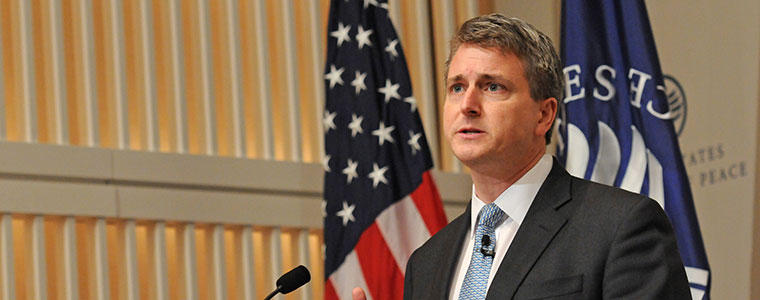Beyond Afghanistan's Dangerous Summer
A Discussion with Ambassador Dan Feldman, U.S. Special Representative for Afghanistan and Pakistan
Ambassador Dan Feldman, the U.S. Special Representative for Afghanistan and Pakistan, assessed regional security issues and efforts to open peace talks with the Taliban in a presentation on August 5 at the U.S. Institute of Peace. Comments also were provided by USIP Chairman of the Board of Directors, Stephen J. Hadley, and USIP’s Vice President for South and Central Asia, Dr. Andrew Wilder, and then the discussion was opened up to the audience.

As the one-year anniversary approaches for the inauguration of Afghanistan’s national unity government, the country is in the midst of a dangerous summer as its security forces battle an intensified insurgency. Despite these risks, the government in some ways has been transformative. President Ashraf Ghani’s outreach towards Pakistan has offered the possibility of a relationship based on mutual benefit rather than mistrust. Significant progress has been made by the Afghan government in its effort to open peace talks with the Taliban, after years of stalled attempts. Internal governance reforms have begun.
Yet in an increasingly complex security environment, the government seems to be in a race against time. Ambassador Feldman discussed these developments and what the United States can do to help ensure these transformations lead to a stable Afghanistan that can act as a strategic partner for the United States in the region. Comments were also provided by Stephen J. Hadley and Andrew Wilder, and then the discussion was be opened up to the audience.
Continue the conversation on Twitter with #USIPAfghanistan.
Speakers
Nancy Lindborg, Welcoming Remarks
President, U.S. Institute of Peace
Ambassador Dan Feldman
Special Representative for Afghanistan and Pakistan, U.S. Department of State
Stephen J. Hadley
Chairman, Board of Directors, U.S. Institute of Peace
Dr. Andrew Wilder
Vice President for South and Central Asia, U.S. Institute of Peace



